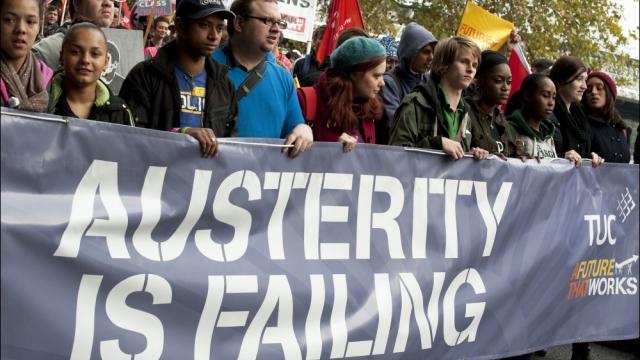
More than 300,000 children living in low-income households in Britain are set to plunge further into poverty thanks to a controversial austerity measure introduced earlier this month by the Conservative government.
On November 7, a cap on benefits began to be rolled out nationwide, significantly reducing the total amount in benefit money people out of work can receive. New research from the Chartered Institute of Housing (CIH) reveals that many U.K. families will lose more than £100 ($124) a week from the controversial household limit benefit cap that came into force this month.
The CIH is now urging the government to reconsider lowering the household limit on benefit payments or be left with a disturbing rise in poverty and even homelessness.
The lower benefit cap will see the annual limit of total benefits per household of £26,000, or £500 per week, reduced to £23,000 in London and £20,000 outside the capital. In August, the government’s Department for Work and Pensions suggested that the number of households to be adversely affected by the cap totals 244,000 children, with families losing £60 a week on average.
However, the CIH research shows an even bleaker picture, claiming a total of 319,000 children will sink further into poverty, with many families losing up to £115 a week. The group estimates around 88,000 households will be affected by the severe welfare cut – predominantly those with large families or high rents.
With eye-wateringly expensive rent to pay, particularly in London, and rising food and energy costs with the arrival of cold weather, losing up to £115 a week will devastate many British families relying on benefits to get by.
The household benefits cap was announced by the former Chancellor George Osbourne in 2015, and approved by Parliament in March of this year. Ministers backing the cap say it will incentivize people living on benefits to find work, as those on benefits with a job will not find be subjected to the limit. According to government officials, the cap is a “clear incentive to move into a job.”
However, such claims have been criticized by opponents of the welfare cap, with many experts citing evidence that shows people living in poorer households find themselves out of work for a host of reasons – and not because they want to be. For example, as free childcare isn't available in Britain until a child is two, many single parents with children find going to work all but impossible.
Seeing their benefits cut, families surviving on already stringent family budgeting say the cap will prove devastating. As Gemma, a single mother of three in South East England who is unable to work and relies on benefits to survive, told Occupy.com: “My weekly budget is already stretched to the limit and having it reduced will mean something will have to give – food, heating, clothes, and as for Christmas presents, there won’t be many under the tree this Christmas.”
Making it More Difficult to Find Work
While Tory officials claim the benefits cap is designed to push people back into work, research has found that ironically the opposite occurs. Studies concur that due to rising poverty, hunger, debt and housing insecurity, cuts to benefits make it more difficult for the unemployed to find work. The controversial benefits sanctions imposed on people claiming job seeker’s benefits, which were introduced several years ago, were found to be counterproductive, leaving vulnerable claimants distressed, worse off financially and reliant on food banks.
As Kirsty McHugh, chief executive of the Employment Related Services Association, told The Guardian: “For the vast majority of jobseekers, sanctions are more likely to hinder their journey into employment.”
John, from Darlington in the North East, has been unemployed and living on benefits for eight months. He told Occupy.com, "It’s simple: when you can’t afford a decent meal and a new suit because you’ve had your benefits cut, you’re less likely to be given a job because you look scruffy, tired and a long way from being the model candidate.”
Children Paying the Price
Figures from the Children’s Society show that 3.9 million children are already living in poverty in the U.K. The new cap on what households can claim on benefits will likely raise that figure, as children continue to pay the steepest price for austerity measures, the Society warns.
The latest cost-saving tactic by Conservatives is a sharp contrast with Prime Minister Theresa May’s pledge that Britain become a “country that works for everyone.” Matthew Reed, Chief Executive of the Children’s Society, described the cap as being a “blunt instrument trying to solve a complex problem."
“Given the Prime Minister’s aspiration of making Britain a country that works for everyone, it is deeply disappointing that the government is pushing ahead with an ongoing agenda of cuts to financial support for children in low-income families," Reed said in a statement. "Making savings by cutting help for the poorest children is unnecessary and unfair.”
3 WAYS TO SHOW YOUR SUPPORT
- Log in to post comments












Comments
DH Fabian replied on
US austerity agenda
This is what the US did 20 years ago, and we have adjusted by ignoring the consequences. For those who fell behind on the news, actual welfare aid ended in the 1990s. All we have today is TANF, a short-term, marginally-subsidized job program, only for those with children, with a strict time limit. Keep in mind that the US shut down/shipped out a huge number of jobs since the 1980s. The last I heard, there are 7 jobs for every 10 jobless people who still have the means to pursue one (home address, phone, etc.). While that's an improvement, what do you think happens to those who are left out?
The US embraced the austerity agenda 20 years ago. We watch now as austerity, predictably, trickles up.